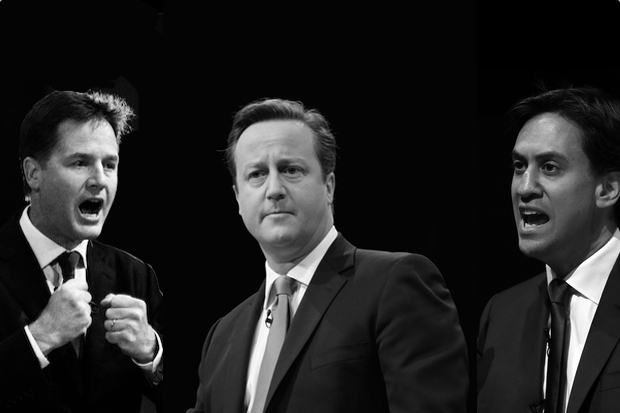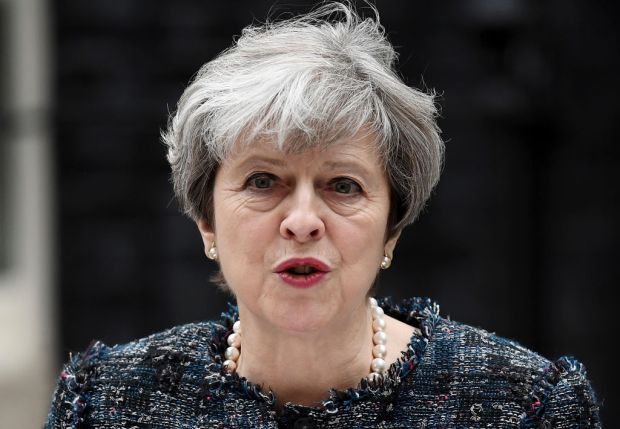Reshuffles are meant to demonstrate the power of a leader, to show that they are in command of their party. But what Ed Miliband, David Cameron and Nick Clegg all revealed this week was not their strengths but their fears.
It was clear that Ed Miliband’s great worry is that in 2015 Labour will look like it is offering a replay of its last stint in government. In policy terms, his answer has been to make clear where he wants to break with the New Labour consensus. First, there were his frequent acts of contrition on immigration, then his conference pledge to freeze energy prices, by law, if elected. In personnel terms, his solution has been to promote a slew of MPs from the 2010 intake. The defining theme of Labour’s reshuffle wasn’t Blairites versus Brownites but the preferment of the new guard: newly elected MPs now make up more than 30 per cent of the shadow cabinet. Tristram Hunt, a protégé of Peter Mandelson’s, can flourish in Miliband’s Labour party because he is a fresh face. One suspects that if he had been in the last government, he wouldn’t be doing so well now.
These new MPs in the shadow cabinet will be sent out to speak for the party at every opportunity. Expect to see the former GMTV presenter Gloria de Piero on television almost as much as she was in her old job. With Hunt at education, Rachel Reeves at work and pensions and Chuka Umunna at Business, the second tier of the shadow cabinet is now dominated by those who weren’t present for the divisions of the Blair/Brown years. But these promotions can’t solve the fundamental problem right at the top of the party: as long as Miliband is leader and, more pertinently, Ed Balls is shadow chancellor, Labour will look like a return to the past. It is still all too easy for the Tories to say that the men who advised Gordon Brown as he crashed the economy are now asking the electorate for the keys back.
This ‘Eds at the head’ problem is compounded by Andy Burnham, who was health secretary in the last Labour government. Retaining him as shadow health secretary means that the Tories can respond to any criticism by pointing to what happened to the NHS on Labour’s watch. And they do, which makes Burnham so infuriated that he’s threatened to sue the Health Secretary Jeremy Hunt. This is not the action of a man who thinks that he is winning the argument.
Cameron, meanwhile, was busy promoting those who don’t fit the Tory stereotype. Esther McVey, a rare Liverpudlian Tory and another former GMTV anchor, was made a minister of state at the Department of Work and Pensions. Sajid Javid, the son of a Pakistani immigrant bus driver, became financial secretary to the Treasury, the most powerful ministerial role outside the Cabinet. And Kris Hopkins, a Yorkshire MP and former army private, was given the sensitive housing brief. Simultaneously, pale southern males were fired.
These appointments are all, of course, designed to help the Tory party show that it is not just the political wing of the Home Counties. Some 84 per cent of voters think that Tories stand for the rich, a statistic which alarms the Tory leadership. So by the next election the Tories should have a parade of people ready to enter the cabinet who don’t look or sound like stereotypical Tories. For the moment, though, they have the same problem as Labour. The top dogs themselves create the wrong impression. These new appointments might be necessary but they are not sufficient to counter Cameron, (Eton, Oxford) and Osborne, (St Paul’s, Oxford).
They do, however, reveal something important about the Tory party. It is moving towards modernising through men, and women, not measures. The two members of the 2010 intake regarded as the most likely future leaders are Javid and Liz Truss, or as Osborne calls her ‘the next Margaret Thatcher’. They both come from the small-state, free-enterprise wing of the party. They are both to the right of the current leadership. However, their backgrounds are not typically Tory. The hope is that this will enable them to reach parts of the electorate that the rest of the Tory party cannot.
Clegg’s reshuffle was, as he himself put it, designed to ‘provide the opportunity for as many in our ranks as possible to contribute their skills to ministerial office’. His priority was not competence but party management. This meant that, rather like a teacher running the cricket team at a progressive prep school, he told ministers doing a perfectly good job to declare themselves out so that the less able could have a go.
His oddest decision was to promote Norman Baker from being a parliamentary undersecretary at Transport to a minister of state at the Home Office. This calls into question Clegg’s whole claim that he is turning the Liberal Democrats into a party that is serious about government.
Baker is almost a caricature of a green-ink brigade Liberal Democrat. He believes that the British state covered up the murder of Dr David Kelly. But Clegg has felt obliged to promote him despite his oddball views to keep party activists happy. Jeremy Browne, a competent, serious, governing Lib Dem has been given the boot to make way for this conspiracy theorist.
These weaknesses and the party leader’s inability decisively to address them is the principal reason that British politics is deadlocked. It is currently hard to see how either of the main parties can secure 40 per cent or more of the vote at the next general election. Indeed, there are senior figures inside Downing Street who believe that the Tories can’t realistically hope to garner this share of the vote in 2015. Instead, they argue that their most likely route to victory is to poll around 38 per cent themselves, keep the Labour vote down to 31 per cent or so and then hope that their targeting of marginal seats delivers a majority for them.
In the past 30-odd years, Britain has had a long period of Tory rule followed by more than a decade of Labour government. But we have now entered what appears to be an era of hung parliaments. The last time a British political party got 40 per cent of the vote in a general election was more than a decade ago when Tony Blair secured 40.7 per cent in 2001. Until the parties remedy their weaknesses, there won’t be a single one in this country that can regularly obtain a majority.
Got something to add? Join the discussion and comment below.
Get 10 issues for just $10
Subscribe to The Spectator Australia today for the next 10 magazine issues, plus full online access, for just $10.
You might disagree with half of it, but you’ll enjoy reading all of it. Try your first month for free, then just $2 a week for the remainder of your first year.















Comments
Don't miss out
Join the conversation with other Spectator Australia readers. Subscribe to leave a comment.
SUBSCRIBEAlready a subscriber? Log in